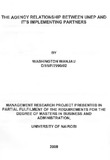| dc.description.abstract | Donor agencies mainly continue to view private sector, regional organizations, and Non-
Governmental Organizations (NGOs) as alternative institutions and main agents with the
ability to provide public services while at the same time exercising some control over
governance. In view of the changes in the governance regimes, many of the obstacles for
these entities to contribute to policy change have been removed. However, there are some
important areas for improvement among these institutions. First and foremost is internal
governance. This includes decision-making processes, division of roles between the board
and executives, as well as issues related to the establishment of a clear vision, mission, and
objectives. The second area to be addressed is accountability. So far, the agents mainly
attempt to be accountable to donor agencies in the form of narrative and financial reports on
projects which may not be adequate.
UNEP has its own budgetary allocations raised from the UN member states. However, the
bulk: of its assets are provided on a voluntary basis by governments, private organizations, as
well as individuals. The limited size of donor base combined with the voluntary nature of
contributions represents a possible cause of instability in the provision of adequate funding.
Thus, in this study the question of extent to which agency theory been applied towards the
achievement of accountability in implementing UNEP programmes in Nairobi is considered
valid and relevant.
A study was set out to examine the extent of the problem between UNEP and its
implementing partners and the mechanisms used by UNEP to address the problems, using a
census research design where 26 questionnaires were administered to UNEP and agencies in
two sets. The study used a descriptive survey design, and collected data from all UNEP
iinplementing partners within Nairobi. UNEP is in partnership with a total of 22
organizations which include 17 Non-Governmental Organizations (NGOs) and 5 government
departments. To assess how agency relationship has influenced their accountability, the
researcher collected data from each partner as well as UNEP programme managers. The
study made use of both seeendary and primary data. Secondary data reviewed relevant
IX
documentations such as the UNEP performance charter, agency agreements, strategic plans,
press articles and performance appraisals. On the other hand, primary data concentrated on
respondents' opinions and appraisals concerning the study variables. The study adopted a
questionnaire instrument which was self-administered. The collected data was examined and
processed and edited to eliminate inconsistencies. Subsequently, the refined and organized
data was coded and analyzed using descriptive statistics.
The findings of the study established that the agency problem is a big challenge to service
delivery within UNEP's implementing partners. About 60% agreed that the agency problem
is complex and new every time. It is not clear to what extent UNEP is aware of problem.
Some of the effects of the agency highlighted includes:- Delay in project implementation and
hence high costs at UNEP, Failure to submit the financial reports which hampers the
financial closure of the projects and UNEP's image as the leader of the world environment
problems has not been very visible in the recent past.
The study indicates that to some extent relationship with development agencies is poorly
initiated and sustained. The main problems include, difficulty to apply discipline against
programme defaulters, Poor compensation to programme staff and Failure to submit final
expenditure statement and final audit report.
UNEP has used the following mechanisms to solve the agency problems.
a) Participatory approaches which include;
i) Use of participatory approach when setting goals.
ii) Standardizing all forms of financial and project reporting.
b) Training of their partners on content of their responsibilities; as a result there has been a
drastic improvement. .
c) Giving their partners autonomy to make decisions under the following circumstances:
i) If past records indicate that the partner delivers the programme outputs as
required, there is a high chance of giving absolute autonomy.
ii) In implementing and carrying out activities on behalf of UNEP as long as they
stick with the timetable and budget.
iii) In cases of vendor selection and StafflExpert recruitment.
iv) Implementation of proj ect activities
d) Designing unilaterally standards of financial reporting by the partners and it has been
found to be highly effective as observed by 80% of the respondents.
The study recommends that for UNEP to nature partnership with Kenyan implementers there
should be;
i) Increased collaboration with the partners.
ii) Continuous capacity building for project implementers
iii) Consultation when planning and budgeting,
iv) Continuous liaison
v) Tailoring projects to local needs
vi) Follow-up after completion and refinancing if required,
vii) Increased budgeting and closer partnership in programme/project implementation
(seconding program managers),
viii) The partnership should be based on professionalism and guided by agents
mandates and finally;
ix) Regular feedback sessions and flexibility in reporting, | en |

